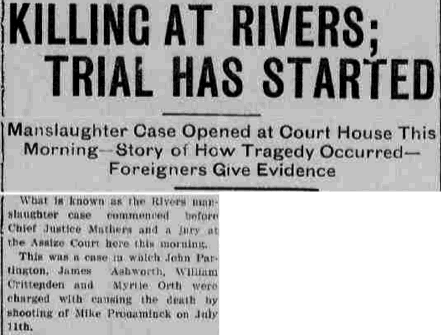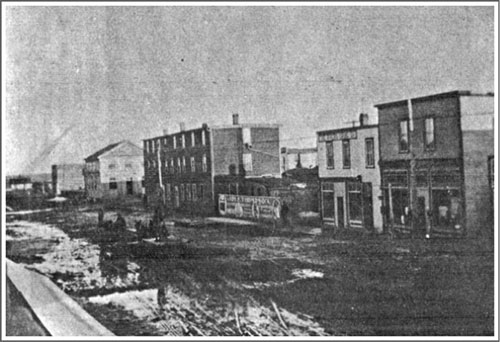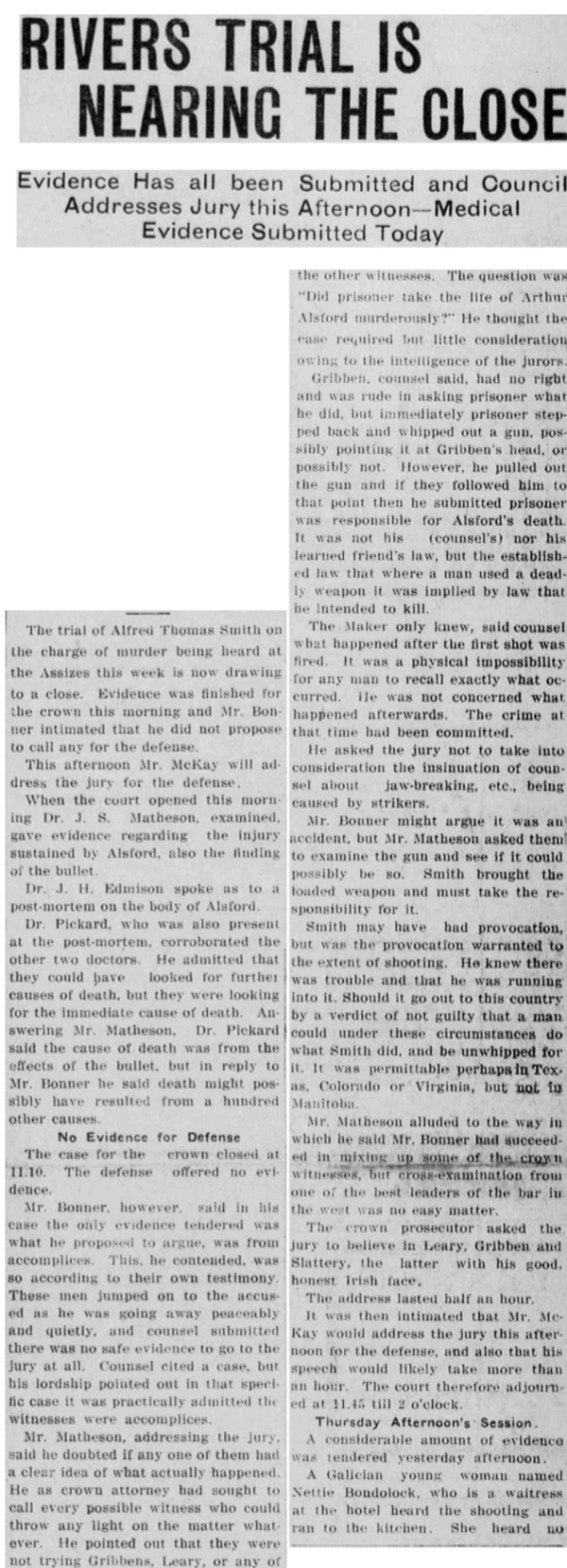|
The Alsford
Murder Trial
In 1911, Rivers resident Arthur Alsford was shot and killed in a
dispute related a Grand Trunk Pacific strike. Alf Smith was charged
with murder, and the trial took place in Brandon.
A component of…
The
Grand Trunk Pacific Railway in Rivers, Manitoba
A Project
of The Rivers Train Station Restoration Committee
2014
The
Alsford Murder Trial
In late 1911, the effects of the ongoing strike by Grand Trunk Pacific
employees was having its effect on the community. There were reports of
skirmishes at the river between strikers and strikebreakers. A leading
official of the international association of machinists addressed a
mass meeting at which local professional men spoke. G.T.P. general
manager E. J. Chamberlin briefly visited the scene, and then departed.

Brandon Daily Sun, Nov. 7, 1911
Mr. Smith reportedly had, without provocation, began firing a revolver.
The striker was hit in the stomach while the porter received groin
wounds. Smith, himself, sustained a skull fracture.
Arthur Alsford, husband and father, veteran of the South African war,
died in Brandon hospital on Christmas Eve, and coroner's jury found he
had come to his death as the result of a bullet wound received from a
revolver in Smith's hands. Rivers band attended the funeral
service held in the Anglican church. Friends and union members
followed the cortege to the cemetery in 30-below weather. Boilermakers
and machinists raised funds with which to assist the stricken family
and the efforts of the Somerville family to ease the blow received
community commendation.
In the spring of 1912, Jack Gribben returned from hospital after being
relieved of a bullet located above his hip-bone (a second such missile
having been found - after passing through the man's body - in a
hip-pocket) about the time Alfred Smith went on trial for the murder of
Arthur Alsford.
Mr. Alsford was a former boiler maker’s helperer at the GTP shops in
Rivers, who had left that job prior to the strike. He belonged to the
Boiler Maker’s Union. There were about 90 members of that union and
they had about a dozen on picketers on duty at the time.
The incident arose out of tensions surrounding the Grand Trunk Pacific
strike and the use of strikebreakers in Rivers and other locations. The
strike had of course caused the usual hard feelings and division in the
community.
There were allegations that strikers had intimidated strikebreakers.
There were accusations and remarks in the local paper and reports that
one strike breaker had been accosted in local church. The allegations
were all denied by the strikers.
On the morning of December 20th, according to Mr. Gibben’s testimony,
he was helping Alston remove some empty bottles at the Cecil Hotel when
they met Smith going out the door.
He asked Mr. Smith if he was working at the shops and when the answer
was “yes” he asked if he was aware that he was “scabbing”. At that
point Smith pulled out a gun and Gibben tried to take it away from him,
assisted by a Mr. Leary.

The Cecil
House, near the centre of this photo was the site of the
altercation that ended in the death of Arthur Alsford.
Mr. Smith claimed that he was attacked and had used his weapon to
defend himself.
Mr. Gribben insisted under oath that they had not attacked Mr. Smith
before he had produced a gun, and that they were trying to merely get
the gun away from him when shots were fired and Mr. Alston was mortally
wounded.
The bartender, Mr. Harry Ving, recalled that Mr. Smith had entered the
bar, bought two bottles of liquor and that he later heard someone say
something like “He’s got a gun” or, “Get that gun.” before shots were
fired. Mr. Ving admitted to being a former employees of the GTP and
being in sympathy with the strikers.
Cross examination brought out the fact that Gibben was something of a
rover, and that he had at some times worked under an assumed
name. The accusation was that he was an “agitator”.
He did admit to knowing ahead of time that Smith was a strike breaker
and to wanting to confront him after noticing him in the bar. He
admitted to telling Mr. Leary to get a stick or something to hit Smith
with and to wrestling him to the ground and kicking him, but insisted
that all this happened after the gun was produced.
His attitude to strikebreakers was summed up by this answer to a
Defense Counsel question about his attitude towards strike breakers.
“If a man comes and takes bread and butter out of your mouth you can’t
feel very friendly towards him, can you.”
Mr. Gibben also admitted that he had been part of a group that did
harass some strikebreakers but denied that Alston was any harder on
strikebreakers than anyone else, just sympathetic to the strikers.
Dr. Schwann, who had been called to the scene, recalled that when he
arrived the prisoner was being held down and that he observed severe
bruises on his head.
Mr. Gibben’s testimony was somewhat corroborated by a bystander Tim
Slattery who reported that when he came on the scene Smith was being
held down by Gibben and Leary while Alston lay helpless and
wounded. Slattery was also a Union member.
Other witnesses such as Police Constable Conrad Matthews, testified
that Smith was well acquainted with revolvers such as the Smith and
Wesson 32 caliber pistol he had, and that he wouldn’t have fired it
accidentally. He also testified in those early minutes after he arrived
on the scene, that someone shout out, “Lynch him”, and that Smith would
have been in danger had he not been there to protect him.
The Constable mentioned an incident two weeks prior to the shooting
when he had removed Smith from a bunch of strikers but that there had
been no threats at that time.
George Sommerville, the Hotel owner testified that he didn’t welcome
strikebreakers in his hotel but when they did appear he saw that they
were protected. He was accused by the defense of uttering threats
toward Smith on an earlier occasion.
There was testimony that despite this serious incident the strike had
been relatively peaceful.

From the Brandon Sun, March 22,
1912
In his summation to the jury Prosecutor, Matheson reminded them that
although Gibben had no right to accost Smith and question him, if Smith
pulled a gun we must assume he was responsible for Alston’s death.
Despite provocation, went his argument; Smith had no right to shoot. He
said, “It is permissible in Texas, Colorado or Virginia, but not in
Manitoba.”
In the end, Smith won acquittal with the jury unable to concluded that
he had intended to commit murder, but the locals, especially union
members were not convinced. When he and re-visited old haunts one
newpaper offered that opinion that that showed "very bad taste”.
“Many strikers think only the 'black cap' would have done
justice." Smith laid charges against Gribben and three other men
in connection with the hotel incident. That case was dismissed
|